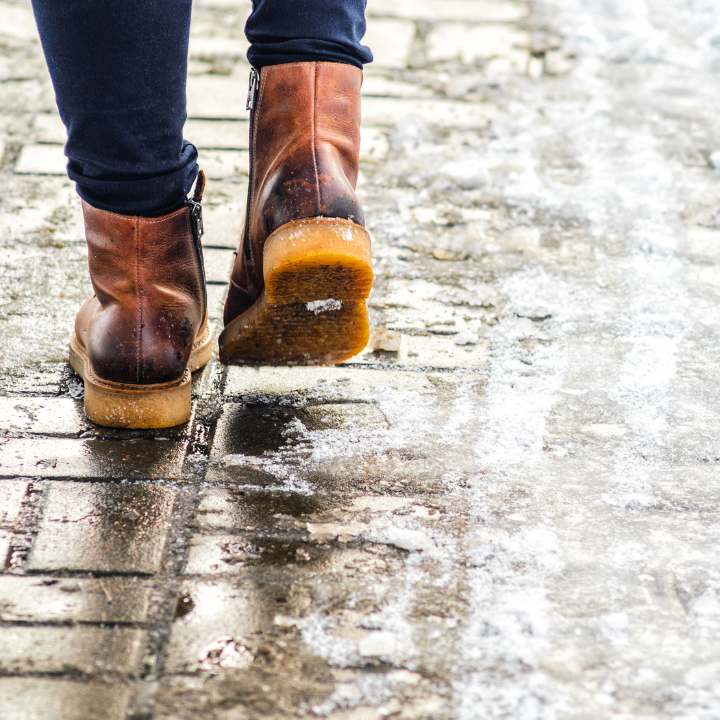As winter approaches, the risk of slip and fall accidents increases. Snowy sidewalks, icy parking lots, and slippery store floors can all lead to potentially harmful incidents. As personal injury lawyers, we know firsthand how these accidents can have a significant impact on one’s life. That’s why we’re here to share our expertise and provide you with actionable tips on preventing slip and fall injuries during the winter season.
Statistics on Slip and Fall Accidents
- In 2017, the U.S. Bureau of Labor Statistics (BLS) reported over 20,000 occupational injuries related to ice, sleet, and snow (excluding falls from heights or through surfaces).
- Slips and falls, as stated by OSHA, contribute to 20% of all workplace injuries, resulting in substantial costs for companies in insurance claims, lost hours from liability lawsuits, and accounting for 15% of all accidental deaths (second only to motor vehicle accidents).
- The CDC revealed that the medical expenses for winter slips and falls reached $50 billion in 2015, with over 800,000 hospitalizations due to slip and fall injuries, predominantly hip and head injuries.
- SFM claims data indicates that 25% of ice- and snow-related falls occur in parking lots, and 20% of slips and falls in parking lots lead to work time loss.
Resource: Winter slips and falls: Avoid common hazards
Common Causes of Slip and Fall Accidents in Winter
Slip and fall accidents are often caused by a combination of factors, including:
- Ice or snow on sidewalks, parking lots, and stairs
- Wet floors from melted snow and ice tracked inside buildings
- Uneven or poorly maintained walkways
It’s important to be aware of these potential hazards and take precautions to prevent accidents from occurring.
Understanding the Risks
Before we delve into prevention strategies, it’s important to understand the risks associated with winter weather. Slip and fall accidents can result in a range of injuries, including fractures, sprains, concussions, and even more serious conditions like traumatic brain injuries (TBIs). These injuries can lead to time off work, extensive medical treatment, and emotional distress. It’s our mission to help you prevent these scenarios.
Clear Snow and Ice Regularly
One of the most effective ways to prevent slip and fall accidents is by regularly clearing snow and ice from your property. This includes driveways, sidewalks, and entrances to buildings. Use a good quality snow shovel and apply salt or sand to icy areas to improve traction.
Wear Proper Footwear
When venturing out into the cold, wearing appropriate footwear is crucial. Choose boots with non-slip soles and consider using ice grips for added stability. Remember, it’s not just about fashion – it’s about your safety.
Be Mindful of Your Surroundings
Always be aware of your surroundings when walking in winter conditions. Look for signs of black ice and avoid walking on uneven surfaces. If you must walk in these areas, take slow, small steps to maintain balance and prevent falls.
Seek Medical Attention After a Fall
If you do experience a slip-and-fall accident, seek medical attention immediately, even if you think you’re not seriously hurt. Some injuries, like TBIs, may not show symptoms right away. Immediate medical attention can ensure you receive appropriate treatment and provide documentation if you decide to pursue a personal injury claim.
Get Legal Help
If you’ve been injured in a slip and fall accident due to someone else’s negligence, such as a business failing to clear its sidewalk, it’s important to consult with a personal injury lawyer. The Ganim Injury Lawyers can help you understand your rights, gather evidence, and fight for the compensation you deserve.
Preventing winter-related slip and fall accidents requires vigilance, preparation, and awareness. But remember, if an accident does occur, you’re not alone. As personal injury lawyers, we’re here to guide you through the legal process and advocate for your rights. Stay safe this winter, and don’t hesitate to reach out if you need our expertise.
